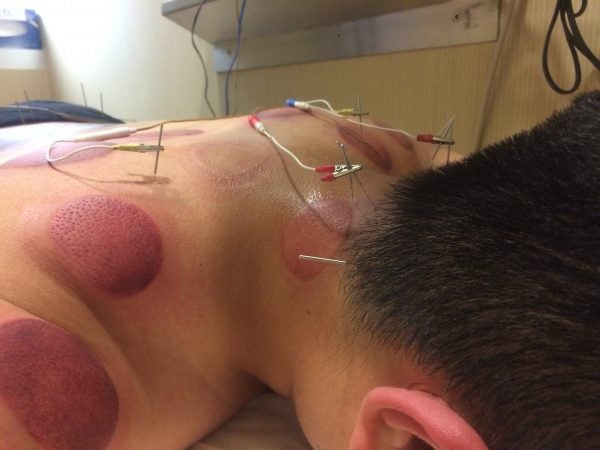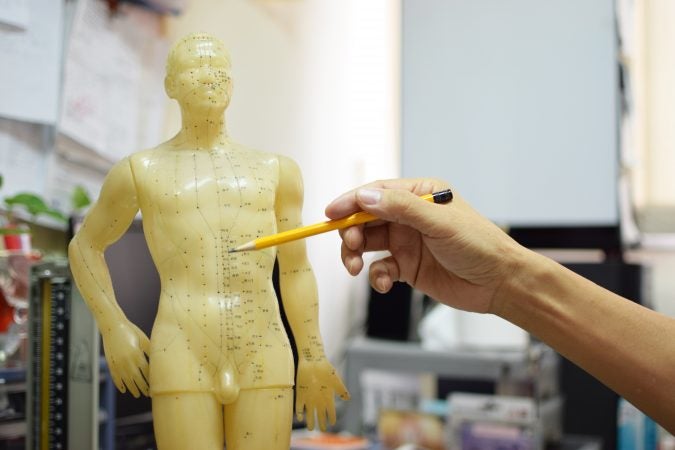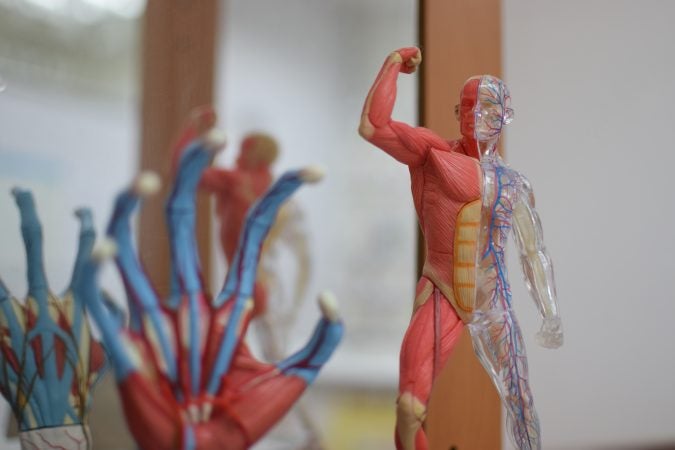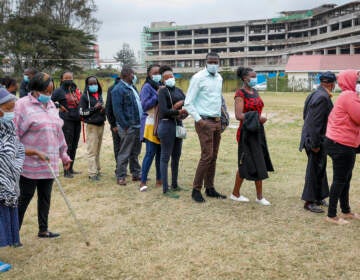Acupuncture: real relief or theatrical placebo?
Alan Yu heads home to Hong Kong to investigate the ways acupuncture is used in the medical system there.
Listen 13:20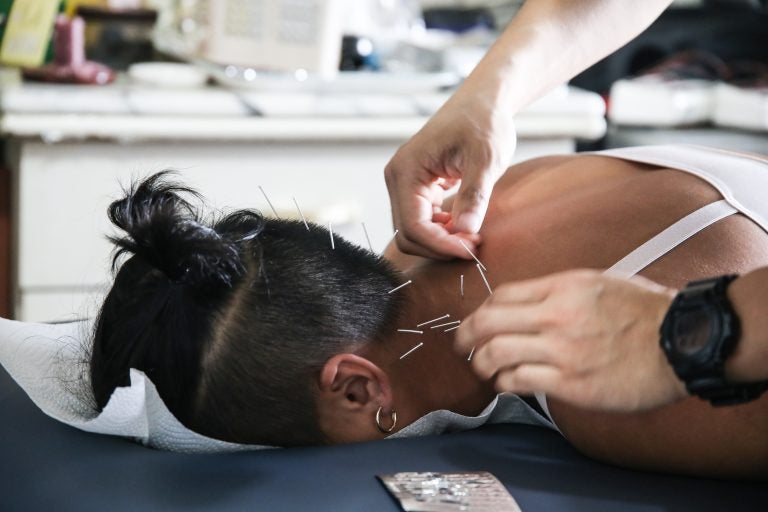
Acupuncturist Toto Cheng performs acupuncture on an athlete. Credit: Li Tin Nok
“Now it feels like my neck and shoulders are more moveable, like they’ve loosened up.”
That’s how Gordon Liu feels after one acupuncture session.
Liu’s a 28-year-old office worker in Hong Kong. He dashes to the Chinese medicine clinic after work to get treatment for his shoulder and neck pain.
Inside a large cubicle curtained off for privacy, an acupuncturist puts needles in points near Liu’s shoulders, neck and hands and leaves them for about 20 minutes.
Liu says it worked.
He tried acupuncture for the first time about a year ago, when the muscles in his neck froze up.
“I couldn’t nod my head or turn my neck at all … I didn’t know what was going on,” he recalls.
He went straight to a hospital emergency room. The doctors ordered an X-ray and an MRI, but they didn’t find anything wrong. He stayed overnight and got painkillers, but nothing worked — except acupuncture.
“I think a lot of people in Hong Kong feel the same way: if we go to western medicine doctors, you’re just getting pain medication. You can buy that on your own. If you take the painkillers and it doesn’t work, then you still need a solution, don’t you?”
This acupuncture session costs about $50. Gordon pays with a credit card, but he says his insurance will cover two thirds of the fee. If he had gone to a western medicine doctor for a consult and pills, his insurance probably would have covered the whole thing.
He’s an actuary, so he understands insurance. Liu speculates the pay difference is because insurance companies are more familiar with the scientific evidence behind western medicine.
This is what some state Medicaid departments and doctors in the United States are grappling with now: what is the proof that acupuncture works, and should insurance cover it?
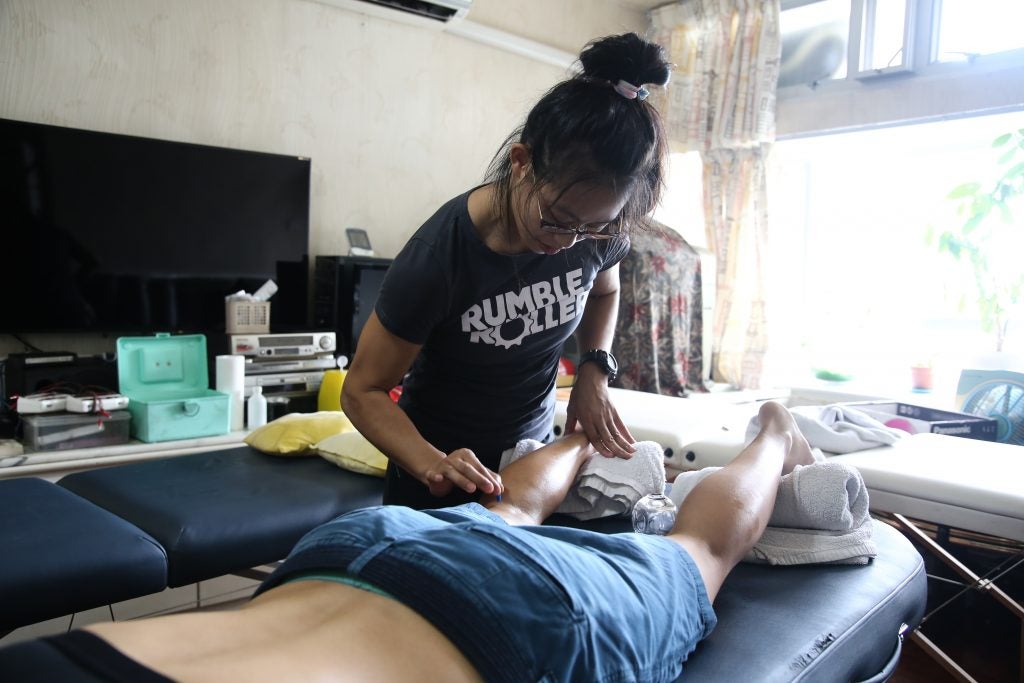
How does it work?
Practitioners say acupuncture needles interact with specific points in our body to regulate the flow of “life energy,” or qi. In this way of thinking, problems like pain happen because of blockages. In a healthy person, the qi is constantly flowing, like a river. For a person in pain, the qi is blocked, like if there’s a big rock holding the river back. We can’t see this qi energy like we can see blood vessels or nerves. The theory is that the needle unblocks it and restores the natural flow of things.
I talked to quite a few people in Hong Kong and the U.S. who get acupuncture for various ailments, and they all tell me that western medicine and Chinese medicine are just good at treating different things. I also heard this from physicians in Hong Kong who practice western medicine.
Take pain specialist Chi-wai Cheung, an anesthesiologist at Queen Mary Hospital, a large public hospital in Hong Kong. He recommends acupuncture to about 5 to 10 percent of his pain patients. He says it’s effective for older patients who can’t tolerate the dizziness or sleepiness from strong painkillers.
What’s the evidence?
A recent review of clinical trials found that there was low to moderate evidence that acupuncture works for chronic neck and low back pain.
In Hong Kong, this is good enough for insurance companies and the health department.
But in the U.S, Medicare programs and a lot of state Medicaid systems won’t pay for the treatment. That’s appropriate, if you ask Steven Novella, a neurologist at Yale University and senior editor of the blog Science-Based Medicine.
“You’re just adding this extra layer of waste into the system, and you are distracting people away from other strategies that might be effective,” Novella says.
According to Novella, patients might say they feel better because of a placebo effect, but their symptoms do not objectively improve. He’s worried that opening the door for acupuncture also opens the door to more treatments that aren’t well-backed with evidence.
“This is the thin end of the wedge where they’re using placebo effects in order to continuously expand their claims,” he says.
But where does that leave doctors who are trying to meet the needs of patients who are in pain? University of Toronto emergency department physician Conor Lavelle says he needs more tools.
Sometimes he has to use extremely strong painkillers, like opioids. He says patients can become dependent after two months, and then they’re back in his office asking for more.
“It was a frustrating thing to have people come in and ask for refills on medications when I didn’t really think it was appropriate to refill them, so I was interested in alternatives,” he says.
Lavelle looked at the research, even tried acupuncture himself, but says acupuncture will probably never be as widely accepted and understood as drugs. He wouldn’t recommend acupuncture to his patients but says it’s reasonable for patients to keep doing it, if it’s not too expensive, and if it works for them.
The International Center for Journalists paid for the reporting expenses of this story with their Bringing Home the World Fellowship.
WHYY is your source for fact-based, in-depth journalism and information. As a nonprofit organization, we rely on financial support from readers like you. Please give today.





